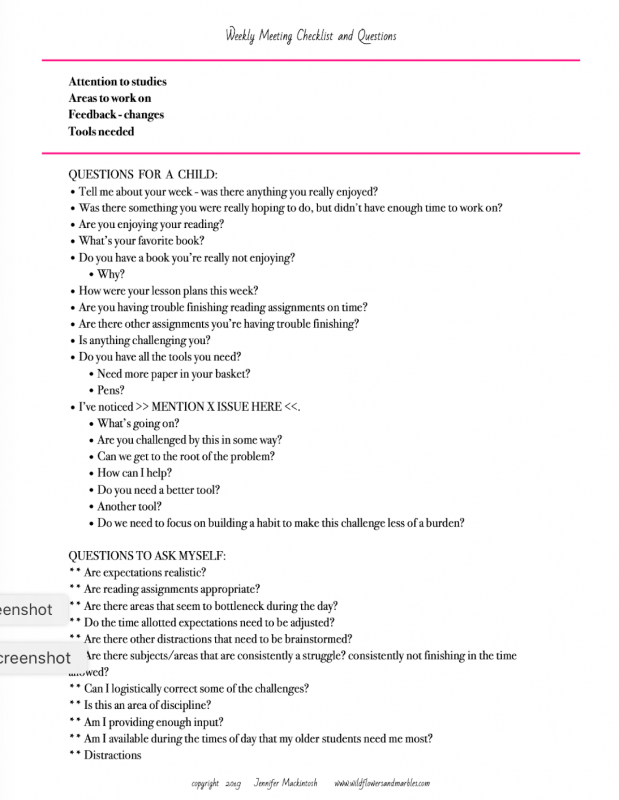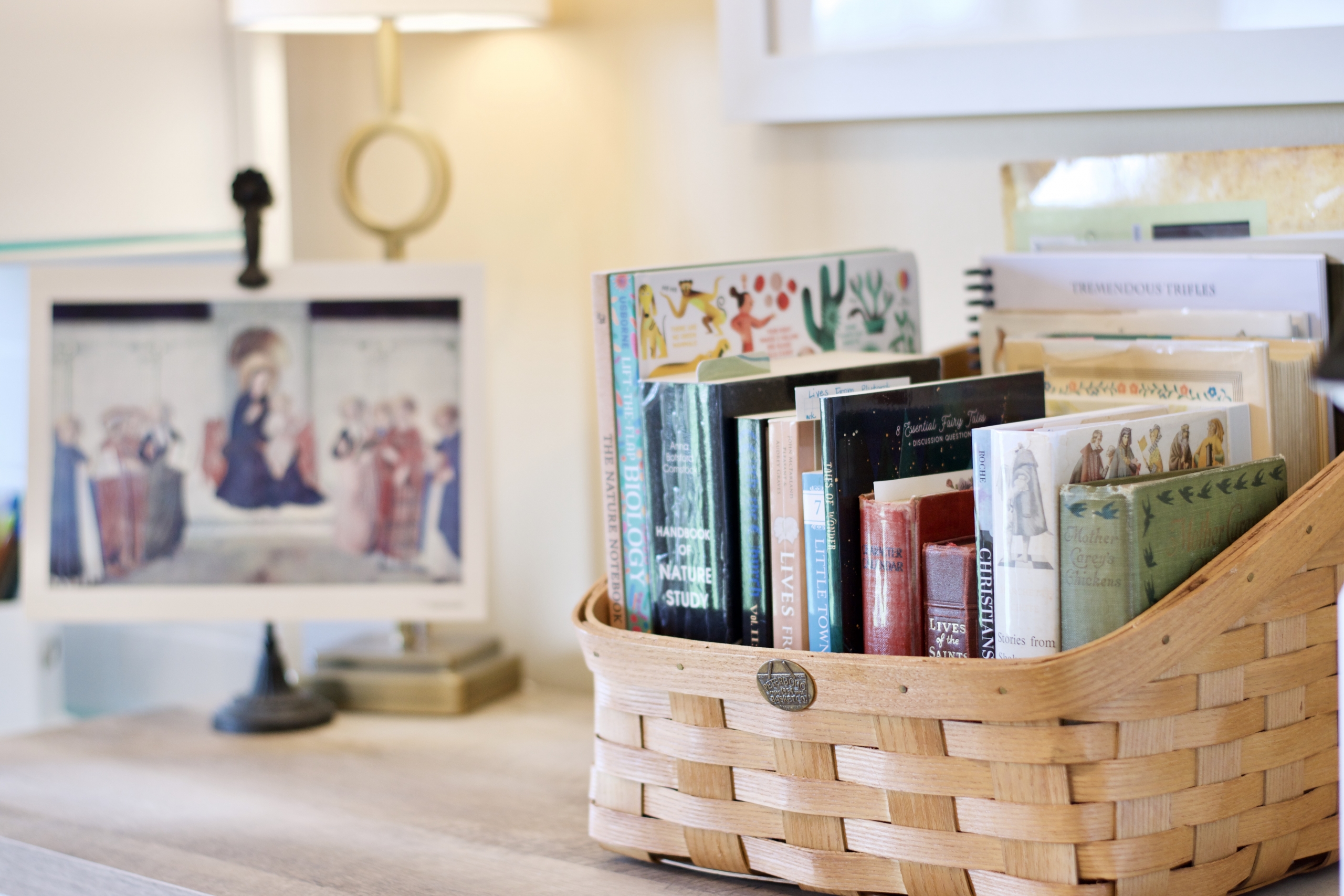Weekly Meetings: A Tool For Homeschool Success

Once upon a time there was a peaceful homeschool. The children were cheerful and loved their reading and their work. They completed assignments with ease and initiative and still had plenty of time to identify and sketch every form of flora and fauna in the backyard. Mother happily worked from task to task and child to child each day, dressed fashionably (always on trend) with lip gloss and coordinating flats, completing everything on her checklist with time to spare each day. And the children all graduated magna cum laude.
Not your reality? Mine either!
Homeschooling is hard work! While it is rewarding and has moments of true joy, it is rarely glorious and never perfect. When my kids were all much younger, and all still at home, I felt like I was scrambling to keep my finger on the pulse of all.the.things and all.the.kids. (My kids are growing up, two have graduated and moved on, and there are only three left homeschooling – yet I still struggle to keep my finger on any kind of pulse!) At the time, I was juggling multiple grade levels, gazillions of books, and trying to assess everything well so that I could ensure kids were working toward mastery and quality, and not just checking some box and moving forward without foundation.

I discovered something – a kind of homeschool chemistry that I have affirmed again and again and again over the years. You know children are each unique right? Of course you do. But did you know that there is a chemical reaction that occurs when that unique child with different gifts, preferences, strengths, weaknesses, and challenges intersects with the homeschool day (books, curriculum, tasks) and you? That chemical reaction manifests itself in a variety of ways: boredom, satisfaction, initiative, tears, distraction, exploration, overwhelm, depression, discouragement, creativity, confidence, defiance, dishonesty, conversation. And more.
When a homeschool mom encounters these different “homeschool-chemical reactions” we tend to recoil into overwhelm! After all, we’re just one mom with a gazillion plates all spinning at once, and we’re trying our best not to drop any of them. So when we see these reactions, we may be tempted to think, “I need to $buy$ something new to fix this. Clearly, my >>insert curriculum or book here<< isn’t working.” But do we?

While that fantasy above of cheerful children and peacefully productive days may seem a little syrupy, I would like to propose that its sister (a far more reasonable and flexible version of cheerful and peaceful) is not as far out of reach as you might envision! There is no magic pill/curriculum to get there. The solution is about atmosphere, communication, discipline (I mean the kind, firm, and consistent sort; not the oppressive kind) and some grit on your part! If you’re facing some challenges from your children and unsure where to even begin, may I suggest a simple tool that I’ve used for many years? A tool that has helped me brainstorm some big challenges in my 19 years of homeschooling? And it won’t cost you one penny to use this tool! I suggest regular communication through a weekly meeting with your child(ren). It may take time, and lots of notes – all of the challenges I met and brainstormed required lots of meetings and notes and brainstorming and prayer and tears on my part, but slowly I discovered solutions that worked, and as part of the process I uncovered many of my own weaknesses so that I could grow, too.
My weekly meetings soon grew into a checklist that I formatted for myself and over the years I’ve amended and added to that checklist. It now lives in my homeschool resource book and I flip to it each week – usually on Friday when I meet with each of the kids. I review the questions that have helped me dig my way to the root of many of the problems we’ve faced, and I invite communication. I meet with the kids individually and these meetings usually take 10-15 minutes at the most, but they uncover some amazing insights – insights that my children would not have normally shared with me.

I know that each of us began our school year with bright, shiny intentions and overflowing hope. Don’t lose that initial joy you had when you planned and organized your homeschool spaces and plans. If things feel a bit stale, try the weekly meetings. See if you can dig to the root of a problem. What can you do to smooth the way? Your child is responsible for meeting halfway – what habits and discipline can they grow? Ask questions. Be content with their answers even if it makes you feel uncomfortable. Ask yourself questions. Let your answers be raw. Then pray. And pray some more. Try a different tactic and keep meeting, keep communicating, keep trying. Work within the resources you have before you pull the trigger on a new whiz-bang.

Click the button below to download the Weekly Meeting Checklist that has been an instrumental tool in helping our days become smooth and peaceful! It’s absolutely free! Use it, share it, and let those questions help you uncover and grow toward a peaceful homeschool!

You can record your notes anywhere! For years, I kept mine in a steno notebook that I kept tucked in a drawer so that I could revisit it. These days, I use this customizable notepad from Erin Condren. I customized the top to say, *weekly meeting, and the three sections work perfectly for my three kiddos. And since I use a discbound notebook for my homeschool resource notebook, I can use my Arc punch to add weekly meeting sheets right to my notebook, which I do for several weeks in order to record obstacles and progress.
Home education is a marathon, not a sprint. The struggles and wrinkles you see today tend to smooth themselves with a little hard work, patience, time, and much love…or you can ignore them and they can become huge fissures. We (myself included) love gathering inspiration from social media, but don’t let that inspiration convince you that there is a quick fix….to anything. It all takes time, effort, and heart. All of it. For years, weekly meetings have been one of the most useful tools in my homeschool tool kit! Consider adding it to yours!
Let me know if you’ve been incorporating weekly meetings in your homeschool! Share your tips in the comment box!







Wow, this is simply brilliant. What an effective tool this is, I suppose this is a reminder to keep open the lines of communication. This way we can know when a child is struggling in an area of study and when he is ready to advance. Thank you, I will be adding this to my homeschool tools!
You’ve got it exactly! I think that when we see our kids struggling or non-compliant or bored…or whatever, we assume we’ve done something wrong or bought the wrong curriculum. Communicating keeps me grounded in perspective and helps me see to the root of an issue and not just the surface friction. It respects the child and it fosters a mutual respect – for example, my kids have never loved Latin, but through communicating they see that it is an objective good and can benefit their education. If we didn’t communicate, Latin would be a fight. With open communication which fosters my own kids’ buy-in on their own education, it reduces the turmoil because the kids are on board with all our educational decisions – even the ones they don’t love!
Yes! The weekly meeting is essential in our homeschool as well. My kids love it. I like that you have a list of questions already prepared. Ours is a little more open-ended, but I am going to try your questions. It will definitely help focus our meeting time a little bit more 🙂 Thank you for sharing!
Truthfully, ours is very open ended most of the time. I keep the questions handy when I’m brainstorming a challenge. It helps me gain perspective and find a foothold. I’m so glad this was a help!
What a wonderful idea! Thank you so much for sharing your experiences, it truly helps us newbies in homeschooling! We will pray for you and your family. God bless!
Thank you so much! I’m so glad it was a help!
Thanks for sharing! 🙂 https://cchomeschoolers.com/blog/